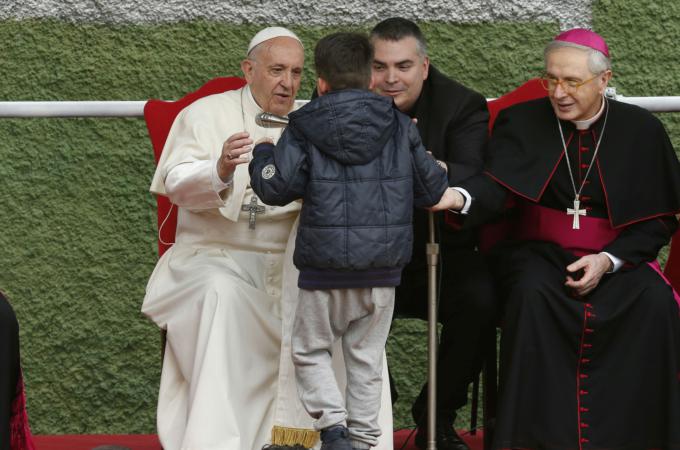Salvation for a nonbeliever?
Q. In a recent issue of our diocesan paper, I read an article about a conversation that had occurred in Italy between Pope Francis and a young boy. The boy -- who was both fearful and tearful, as he whispered his question to the pope -- wanted to know whether his deceased father was in heaven. The answer Pope Francis gave to the boy seemed shocking to me as a believing Catholic.
The little boy had told the pope that his father was "not a believer" but was "a good man" and had seen to it that all of his children were baptized. The article quoted the pope as saying, "He had a good heart. ... With a dad who was not a believer but who baptized his children ... do you think God would be able to leave him far from himself? ... Does God abandon his children when they are good?"
The pope then encouraged the boy to talk to his father and to pray to him -- so essentially he was telling this boy that his dad was saved.
For the pope to tell a child that his dad is in heaven simply because he baptized his kids rings false to me. If one only needs to baptize one's children to be a shoo-in for heaven, then why put ourselves through the difficulty of practicing our Christianity? And isn't it true that "being good" doesn't save us without faith?
I understand that the pope wanted to console this grieving child, but only acceptance of Jesus' redemptive work saves us from our sins and we're not sure whether the father ever made a confession of faith. So I feel that the only accurate answer to give to the boy was, "We just don't know." (Powder Springs, Georgia)
A. Technically, I suppose, you are right. Pope Francis could not issue an absolute and ironclad guarantee that the boy's father was in heaven. But I would have answered the same way he did, and here is why: I believe -- and Pope Francis probably does, too -- that most people are going to wind up in heaven.
Otherwise, why would a loving God have created billions and billions of people if the whole enterprise was largely doomed to failure? So, in my mind, the odds are that the boy's father -- especially since he was a "good man" -- is now in heaven or on his way there, and the boy can reasonably speak to his father and even pray to him.
And by the way, I disagree with your contention that, in order to make it to heaven, a person must make a conscious and personal "confession of faith" in the redemptive work of Jesus.
The Catechism of the Catholic Church, quoting the Second Vatican Council, says, "Those who, through no fault of their own, do not know the Gospel of Christ or his church, but who nevertheless seek God with a sincere heart, and, moved by grace, try in their actions to do his will as they know it through the dictates of their conscience -- those too may achieve eternal salvation" (No. 847).
Q. I am very disappointed that the church does not celebrate the Ascension of the Lord in a more profound way and always moves it to the following Sunday. After all, it is the day when Jesus returned to heaven to live in all his glory -- and we celebrate Mary's feast of the Assumption with its own holy day. (Russellville, Arkansas)
A. In the United States, when you celebrate the Ascension depends on where you live. The determination is left to the bishops in a region ("ecclesiastical province") -- and so, in New England, New York, New Jersey, Pennsylvania and Nebraska, the feast remains on Thursday while in the rest of the country, its celebration has been transferred to the following Sunday.
Most provinces felt that, since that Thursday was normally a work day, it was more difficult for Catholics to fulfill the obligation of Mass on the holy day and to maintain a more contemplative spirit. Interestingly, though, the Catholic bishops of England and Wales, who in 2006 had transferred the celebration to Sunday, in 2017 moved its observance back to the original Thursday date.
- - -
Questions may be sent to Father Kenneth Doyle at askfatherdoyle@gmail.com and 30 Columbia Circle Dr., Albany, New York 12203.
- Father Kenneth Doyle is a columnist for Catholic News Service



















